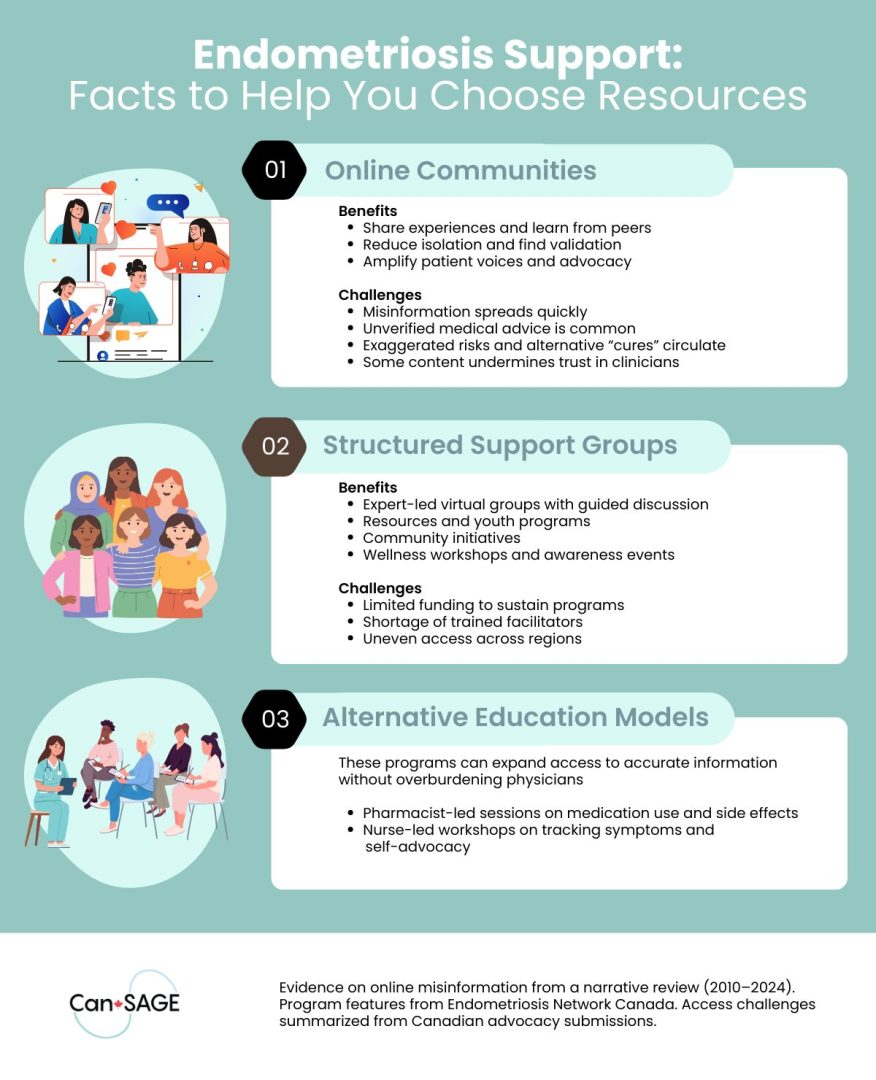Summary:
Different resources and support systems for endometriosis exist in Canada, but they are not all equally reliable. Patients often turn to online spaces for support, but while these communities can provide connection, they can also spread misinformation. Structured support groups led by qualified facilitators offer more reliable alternatives, yet their reach is limited by funding and access challenges. New models like pharmacist- and nurse-led education sessions show promise in bridging the gap, providing accurate information and support without overburdening physicians.
Endometriosis Patient Resources & Support Systems
Having endometriosis affects every part of daily life, so it’s not something you can just forget about between medical appointments. That means it’s natural to search for information and endometriosis resources on your own time. But the search for accurate information and meaningful support can be a challenge in and of itself.
Online communities, support groups, and healthcare-led resources for endometriosis all exist, but the quality and reliability of these systems vary widely. This guide explores the strengths and limitations of current patient resources for endometriosis, common pitfalls to watch out for, and potential new models that can help provide trustworthy information without placing unsustainable demands on physicians.
Online Communities
People living with endometriosis often search the internet to find support. The sheer number of social media groups, forums, and advocacy networks that exist makes it easy to connect with other people who understand the chronic pain, fertility struggles, or difficulty navigating the healthcare system that commonly come with this condition.
Research shows that these spaces come with several pros and cons:
Benefits
Some of the potential advantages of accessing online endometriosis communities include:
- Information sharing: Participants often use popular social media platforms to learn about symptoms, treatments, and care pathways when clinical guidance is hard to access.
- Social support: Online groups reduce isolation and provide validation from people with similar experiences, which many say improves day-to-day coping.
- Representation: Social platforms may create space for patients in historically marginalized populations to describe their illness in their own words and make invisible symptoms visible. The Canadian Medical Association Journal has highlighted the need for culturally competent and inclusive endometriosis care.
- Advocacy practices: Community organizing and storytelling can help challenge myths, identify care gaps, and facilitate more patient-centric conversations with clinicians and researchers.
Challenges
But while online spaces may provide meaningful emotional support and can reduce feelings of isolation, they also come with considerable risks:
- Misinformation: Online spaces frequently amplify false or misleading claims about reproductive health. For endometriosis, this includes the widely circulated but incorrect idea that it makes pregnancy impossible.
- Unsupported recommendations: About 23% of online reproductive health misinformation involves medical advice that does not align with professional guidelines (for example, promoting the inaccurate idea that natural family planning methods are as equally effective as contraception).
- Promoting alternative medicine: Roughly 14% of misleading content promotes unproven remedies, such as herbal abortifacients or dietary “cures” for chronic conditions like endometriosis, despite no clinical evidence of this.
- Exaggerated risks of legitimate treatments: Online narratives often overstate legitimate side effects of evidence-based interventions, such as emphasizing weight gain or mental health harms from contraception while ignoring therapeutic benefits. Similar exaggerations have appeared in claims about vaccines and fertility.
- Undermining trust: A smaller but significant portion of misinformation (about 5%) directly casts doubt on medical experts and institutions. This undermines trust in clinicians and reinforces existing skepticism among patients who already feel dismissed or unsupported in reproductive healthcare.
Online spaces can provide important opportunities to connect with other people with lived experiences of endometriosis. But they should not replace evidence-based guidance from medical professionals.
Structured Support Groups
Structured support groups, such as those run through hospitals or community health organizations, can offer a more reliable alternative. Some of these, like the virtual support groups by the Endometriosis Network of Canada, also take place online. The difference is that they are facilitated by qualified and credible medical practitioners.
Benefits
Programs like these go beyond casual peer-to-peer exchanges. They offer:
- Expert-led virtual support groups where participants can share experiences in a safe, guided environment.
- Educational resources through tools like the Endo Hub, youth-focused materials, and both in-person and online events.
- Community connection via initiatives like the Endo Ambassador program for underserved populations, as well as the possibility for engagement via social media in moderated spaces.
- Wellness and awareness activities including virtual workshops and national events like the Run to End Endo fundraiser.
Challenges
Even when structured support groups exist, accessing them can be difficult. Submissions to the House of Commons by EndoAct, a Canadian advocacy group focused on endometriosis, shed light on several of the key obstacles these programs face:
- Limited Funding: Sustaining these groups requires financial support for facilitators, resources, and administration. Because endometriosis treatment is already underfunded in Canada, securing additional funds specifically for support programs can be especially difficult.
- Trained Facilitators: Groups need leaders with expertise in both medical information and patient support. Recruiting and retaining qualified facilitators is a challenge without stable funding.
- Uneven Access: Many regions do not have dedicated groups, leaving patients with long waitlists or no access at all. This forces some people to rely on informal or unmoderated online spaces instead.
- Structured support groups for endometriosis are widely recognized as valuable. But without greater investment, they remain limited in scale and accessibility.
Alternative Models for Patient Education
Because structured, physician-led groups are difficult to maintain, some experts have begun exploring new approaches to bridge the gap. Alternative models include:
- Pharmacist-led sessions: Pharmacists are often accessible and well-versed in medication management. They can host educational sessions about pain relief, hormone therapy, or medication side effects. Forums and programs are already appearing that can help pharmacists develop the skills they’ll need to successfully lead these initiatives.
- Nurse-led workshops: Nurses with experience in gynecology or chronic illness care can provide group education on symptom tracking, self-advocacy, and lifestyle management. These kinds of programs are already being researched and explored in various parts of the world.
These models offer the potential to distribute responsibility across the healthcare system, making patient education more sustainable without placing additional strain on physicians.
How to Find Expert Information on Endometriosis
Medical experts and established health organizations provide the most trustworthy sources of information on endometriosis. If you want to know the advice you get is reliable, safe, and right for you as a patient, your own doctor or specialist will always be the best place to start.
Content from well-established universities, hospitals, professional societies, and non-profits is also usually trustworthy. What they share is typically peer-reviewed by experts and well-sourced.
With other blogs, articles, videos, and social media sites, it may be difficult or even downright impossible to tell if what they share is coming from an expert. Asking these seven questions can help you assess the source, but you should never adopt a treatment or take the advice until you run it by your doctor.
1. Who’s responsible for it?
- Look for the author or organization behind the content. Trusted sources often include .gov, .edu, or well-known health groups. Some platforms, like YouTube, now add labels under health-related videos to show when the content comes from an official or verified source.
2. Who paid for it?
- If the company sells supplements, devices, or medication, the message they’re sharing could be biased in support of it. Keep this in mind when you’re reading or watching their content. The most reliable information tends to come from universities, hospitals, or nonprofits.
3. Who benefits?
- Ask who benefits from the content and what they stand to gain from it. For social media influencers, this will typically be likes, shares, and follows. For websites, it may be sales of an endometriosis-related product or even third-party advertisements instead.
4. Is it backed by evidence?
- Check if there are any studies or guidelines from experts that support the claims they make in their content. Use the DISCERN questionnaire to evaluate news sites and other publications and the studies and research they share.
5. Is it recent?
- Researchers discover new data about endometriosis every single day, so older content may be outdated or even completely obsolete. Avoid anything over 5–10 years old unless you can tell it was updated recently for accuracy.
6. Does it follow basic quality standards?
- Sources you can rely on want to be clear about who wrote the content, where it came from, and who paid for or sponsored it. They’ll clearly set apart any ads or attempts to sell you something and may have a seal of approval from well-known health agencies, like the CDC or WHO.
7. Does the info feel balanced?
- This is a bit subjective, but still worth mentioning. Content should cover both the benefits and the limits of treatments and other related topics instead of trying to hide the truth. This helps to ensure that you’re well-informed so you can make the best possible choices about your health.
The other main benefit of working with a professional is that they can put any recommendations or advice into context and help you decide if it’s safe for you. Content that is otherwise trustworthy can still be hazardous to your health if you have extenuating health factors like allergies, a risk for blood clots, or a bleeding disorder.
Where to Find Trustworthy Info About Endometriosis
| Source | Who’s Responsible? | Who Pays? | Who Benefits? | Based on Real Evidence? |
| CanSAGE | Canadian gynecologists and other experts | Funded by the CanSAGE Foundation | Patients, clinicians | Yes |
| GynQI | Canadian researchers & providers | Academic and professional research grants | Patients, providers | Yes |
| Cleveland Clinic | Major US hospital | Non-profit health system, the Cleveland Foundation | Patients, research community | Yes |
| Mayo Clinic | Major US hospital | Non-profit health system, other sources | Patients, research community | Yes |
| Johns Hopkins Medicine | University-affiliated hospital | Non-profit academic institution, other sources | Patients, clinicians | Yes |
| Harvard Health | Harvard Medical School faculty | Subscription/news site, other sources | Public readers, university reputation | Yes |
| PubMed | US National Library of Medicine | Federal government, other sources | Researchers, clinicians | Yes |
| Society for Endometriosis and Uterine Disorders (SEUD) | International specialists | Professional society, board members | Patients, clinicians | Yes |
| NICE Guidelines (UK) | UK National Institute for Health & Care Excellence | UK Government | Patients, providers | Yes |
| Health Canada | Federal health agency | Canadian Government | Canadian public | Yes |
| Verified doctors on social media | Licensed professionals | Independent / sometimes sponsored | Followers, personal brand | Sometimes. |
| Influencers / wellness brands | Non-medical individuals | Product sales, ads, other sources | The brand, not patients | Anecdotal at best. |
What to Do If You Have Questions About Endometriosis
Research on endometriosis is ongoing, so even professionals who work in the field need to continuously update their knowledge to stay on top of it. Gynecologists, urogynecologists, and other endometriosis specialists are the most likely to know about the latest research because it’s what they do everyday.
If you don’t have access to a specialist, are still waiting for an appointment, or need answers before your next appointment, you have a few options:
- Check the claims or info against a Canadian authority. If you see a claim online, look for the same information on Health Canada, CanSAGE, or your provincial health portal.
- Bring it to your family doctor. Print or save the post or article and ask your family doctor or nurse practitioner if it’s legitimate and applies to you.
- Call 811. In most provinces, this will let you connect with a nurse who can answer general questions or confirm if any advice is safe for you.
- Book a virtual visit. Services like Maple and provincial telehealth programs give you the option to speak to a licensed Canadian physician about your endometriosis. This can be useful if you’re having trouble getting an appointment or struggling with symptoms.
Think of reading content online like the first step in the process. It can help you understand endometriosis and may even give you helpful suggestions for managing it at home, but it isn’t meant to replace the advice you get from your family doctor, gynecologist, or specialist.
Find Reliable Endometriosis Resources in Canada
Managing endometriosis also means finding reliable sources of knowledge and support. Online communities can be helpful, but misinformation remains a real risk. Structured support groups offer more trustworthy guidance, but they are frequently limited by funding and access.
New models, such as pharmacist- and nurse-led education sessions, show promise in making accurate information more available. By promoting resources that complement medical care, it will be possible to create an environment for all people with endometriosis to find meaningful support.
Looking for more information on endometriosis? Explore our videos on this subject.
Download the CanSAGE Endometriosis Patient Resources and Support Systems PDF



